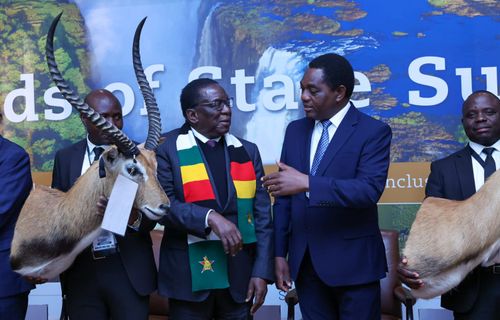By John Mukela
Daniel Foote was an American career diplomat who served as United States Ambassador to Zambia until his unceremonious expulsion by then President Edgar Lungu’s administration in December 2019.
His expulsion was because he said he was “horrified” by the Zambian government’s jailing of two men to long prison sentences of 15 years with hard labour for homosexuality.
He juxtaposed the jailing of the two men to the soft treatment given to criminals who stole donor development funds, but were by comparison treated with kids’ gloves by the courts.
It was hypocritical, in his view.
The government wanted diplomats “with open cheque-books and closed mouths!” he retorted.
Zambia was at that time the recipient of an annual US$500 million of U.S. aid.
After Zambia, Foote was to cause another diplomatic stir two years later as US Special Envoy for Haiti.
His brief to Haiti was “to facilitate long-term peace and stability and support efforts to hold free and fair presidential and legislative elections.”
Appointed in July 2021, Foote was in the Special Envoy job for a mere two months, only to tender his resignation in September.
In his resignation letter to Secretary of State Anthony Blinken, Foote said he did not want to be associated with the United States’ “inhumane, counterproductive decision to deport thousands of Haitian refugees” back to the island nation.
“I will not be associated with the United States inhumane, counterproductive decision to deport thousands of Haitian refugees and illegal immigrants to Haiti, a country where American officials are confined to secure compounds because of the danger posed by armed gangs in control of daily life,” Foote wrote in his resignation letter.
Clearly, you could say that Daniel Foote is a man who speaks his mind and doesn’t mince his words.
Regional democratic leader
I recall a particular discussion with Foote as US Ambassador to Zambia, about Zambia’s geo-political space and its role as a stable regional actor and facilitator.
As far as Foote was concerned, while Zambia had a record of democratic stability, it still needed to maintain and advance its democratic achievements to realise its potential as a regional democratic leader.
Foote was keen to emphasise that Zambia’s stability was important as a bulwark against the comparative disfunction of its northern and southern neighbours.
The Democratic Republic of Congo in the north, where civil strife and various insurgencies (M23 rebels, Lord’s Resistance, etc) have been a constant in the east of the country.
Zimbabwe in the south, where economic and social meltdown has torn a thriving regional economy to tatters – with its hallmarks: state decay, economic decline and the rise of the black market.
With 105,000 refugees and asylum seekers at its three main refugee resettlement centres, Zambia has one of the largest refugee resettlement schemes in the region.
Other undocumented illegal migrants continue to lurk in the shadows, hiding in the urban towns and cities.
From 1966, Zambia has welcomed asylum seekers, and Mnangagwa, a graduate of the University of Zambia, is himself a beneficiary of Zambia’s open-door refugee policy.
It is so easy for a “good” country to slide into disrepute and chaos, and Zambia is no exception.
The world is littered with such countries, and all one has to do to get a sense of it, is to listen to the news.
In fact, according to a recent global study by the Reuters Institute, more people are turning away from news, describing it as “depressing, boring and relentless.”
So many things can cause countries to fall from grace to doom, some of them self-inflicted, others the work of hidden geopolitical hands, sometimes and quite often, both.
Throughout history, empires have arisen, only to falter and fall.
South Africa, for example, was barely 30 years ago clinging at the edge of a precipice from which it is still reeling and struggling to come grips.
Still traumatized by apartheid, systemic violence and crime has wrought havoc on its communities.
Yet despite the widespread corporate and political corruption, widening social and income inequalities, it nevertheless continues to remain a beacon of hope for many.
Ask the hordes of illegal migrants from the Horn of Africa – Somalia and Ethiopia, etc, risking their lives crammed like sardines in fuel tankers and container trucks on their way to Joburg, the “city of gold” now turned “gangsters’ paradise”.
Zimbabwean migrants next door do no better, trekking far and wide in search of greener pastures in neighbouring countries, Zambia included.
Zimbabwe’s tragedy is that it has needlessly lost precious years, from which it will be a hard slog to recover, even with the best of leadership options, after the disastrous final years of Robert Mugabe’s ZANU-PF.
After Mugabe, Comrade Emmerson Mnangagwa, himself complicit in the wasted years of decline, has fared no better than his predecessor.
The recent video clip in which he is heard snitching on Zambia to President Vladimir Putin in Moscow confirms his level of desperation.
Before his elevation to the presidency, Putin was after all, an accomplished foreign intelligence officer, serving for 16 years with the KGB before a brief stint as director of the KGB’s successor, the Federal Security Service (FSB).
There was nothing that Mnangagwa could have told Putin, of which Putin would have been ignorant.
In the video clip, Mnangagwa gushes with boyish excitement, almost tripping on his words in his haste to as it were, “spill the beans.”
Putin on the other hand, remains nonchalant and listens with cynical disbelief.
Maiden ministerial statement
Mulambo Haimbe, the newly-appointed Foreign Affairs and International Cooperation Minister, delivered his maiden ministerial statement to parliament by urging SADC and the African Union to resolve the diplomatic spat that threatens to scuttle the warm and cordial relations between “Zed” and “Zim,” the two symbiotic twins formerly known as Northern and Southern Rhodesia.
Haimbe’s statement was in response to Mnangagwa’s Moscow video, where he calls for increased military and deeper Russian involvement in Zimbabwe, in order to counter the United States.
“The Americans are consolidating their power in that country (Zambia), both in terms of security and financial support to make sure that we feel lonely,” he told Putin.
In his parliamentary statement, Haimbe affirmed Zambia’s “grave concern” over the contents of Mnangagwa’s Moscow video and considers it “an unwarranted attack on Zambia’s sovereignty,” stressing that this sovereignty “must be respected and will be respected.”
A few days before the Moscow video, Mnangagwa had joked and bantered with Hichilema in Livingstone, during the Kavango Zambezi (KAZA) Heads of State Summit in Livingstone.
But soon after, there he was in Moscow, stabbing his colleague in the back.
No wonder at South African President Cyril Ramaphosa’s inauguration last week, Hichilema was conspicuously absent.
In attendance were King Mswati III of Eswatini, Nigerian President Bola Tinubu, Zimbabwe President Mnangagwa and former Kenyan Prime Minister Raila Odinga.
With respect to relations between Mnangagwa and Hichilema, it is obvious that behind-the-scenes dynamics are currently at play.
82 year-old Mnangagwa, a veteran of Zimbabwe’s chimurenga, sees Hichilema, 20 years younger, as a green-behind-the-ears rookie.
But whereas Hichilema appears to have made significant strides especially with steering the Zambian economy to calmer waters, little progress has been registered in Mnangagwa’s Zimbabwe.
Diplomatic tiffs between Zambia and Zimbabwe are nothing new.
In the years leading up to Zimbabwe’s independence, Kenneth Kaunda was blamed by Robert Mugabe’s ZANU for his initial inclination towards Joshua Nkomo’s ZAPU.
And decades later, was it not Levy Mwanawasa who had called Zimbabwe a “sinking titanic,” thereby eliciting President Mugabe’s wrath?
Mnangagwa’s beef with Hichilema appears to have initially been sparked off by the preliminary report of the SADC electoral observer mission to Zimbabwe’s 2023 polls, under the chairmanship of former Zambian Vice President Nevers Mumba.
Mumba’s damning report of widespread irregularities surrounding those elections did not sit well with Harare.
Zimbabwe’s struggling economy has also complicated Mnangagwa’s efforts.
With the country’s current external debt sitting somewhere around US$18 Billion, with US$4.1Billion owed to the Paris Club, Zimbabwe’s January 2024 appeal for debt forgiveness and penalty waivers has so far fallen on deaf ears, with the United States halting its participation in a crucial debt restructuring programme, citing lack of progress on human rights abuses, electoral reforms and crackdown on the opposition.
It is easy to understand why with all this on his plate, Comrade Mnangagwa was compelled to solicit a listening ear from President Putin in Moscow.
The long years of Western sanctions against his country must be taking their toll, further exacerbating his loneliness.
Zambia the peacekeeper
As for Mnangagwa’s implied existence of a Zambian military threat, there is no evidence to back it.
If anything, the opposite is more accurate, with Zambia more intent on continuing to promote peaceful co-existence with its neighbours, and contributing peacekeeping troops to the various continental hotspots.
Zambia’s first peace-keepers were to Iraq in 1988 and Army Commander Lt.
General Ali Alibuzwi, is a veteran of peace-keeping missions to Sierra Leone, Ethiopia/Eritrea, Angola and Darfur.
According to General Alibuzwi, the biggest threat to Zambia’s security is Zambians themselves.
“We are a threat to ourselves because we are not security conscious,” says Alibuzwi.
He cites Zambia’s wide and porous borders, human and drug trafficking and illegal smuggling of precious minerals, as worrying security threats.
Mnangagwa’s attempt to import the Russian-U.S. cold war to Zambia’s doorstep does not bode well for relations between the two neighbours.
But Haimbe played it safe in his ministerial statement to the Zambian parliament, leaving the door open for an amicable reconciliatory dialogue between the two neighbours.
“Zambia remains open to fostering and deepening relations with likeminded, brotherly, and sisterly nations even in the face of misunderstandings that may arise from time to time,” Haimbe said.

Discover more from MAKANDAY
Subscribe to get the latest posts sent to your email.



